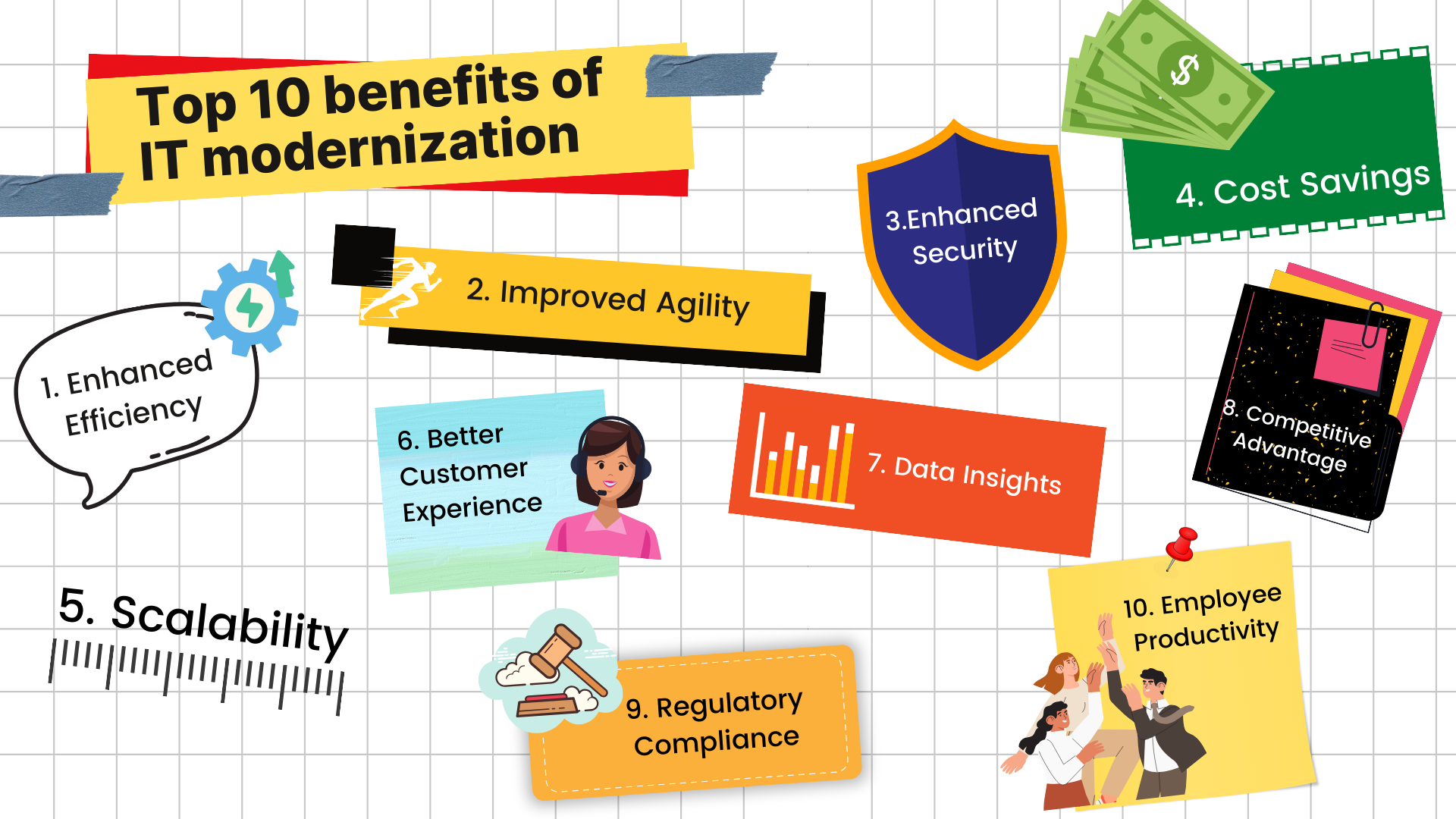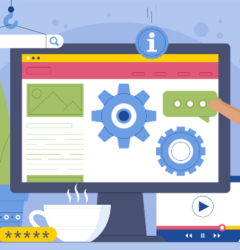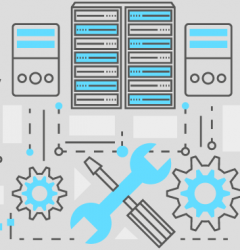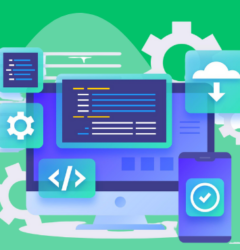
Have you ever wondered how businesses manage to keep up with the breakneck speed of today’s corporate landscape? In a world where competitiveness isn’t just a choice but a survival instinct, companies are in a perpetual race to stay ahead. The secret weapon in this relentless pursuit? IT modernization.
Imagine a company that’s always evolving, reinventing, and fine-tuning its operations not just to survive but to thrive in this ever-shifting terrain. That’s where IT modernization steps in as the hero of our story. In this article, we’ll delve deep into the myriad IT modernization benefits bring to your business, from cost savings to enhanced security, efficiency, and a significant edge in the market.
IT Modernization Benefits
Technology is in a constant state of flux. What served your business well a few years ago may no longer be effective today. This is where IT modernization steps in. It’s the strategic process of updating and improving your IT infrastructure, systems, and processes to align with the latest industry standards and emerging technologies.

1. Realizing Cost Savings
Trimming IT costs is a primary goal for businesses looking to bolster their bottom line. Here are some concrete ways IT modernization can help achieve this:
- Embracing Cloud Migration: Shifting your data and applications to the cloud can lead to substantial savings by reducing the need for costly hardware & ongoing maintenance. You’ll only pay for the resources you actually use.
- Leveraging Virtualization: Virtualization technology allows you to run multiple virtual servers on one physical machine, optimizing resource utilization and lowering hardware expenses.
- Energy Efficiency: Investing in energy-efficient hardware and practices reduces electricity bills and demonstrates your commitment to environmental responsibility.
- Outsourcing: Outsourcing IT services provides access to specialized expertise while reducing labor costs. Managed IT services can efficiently handle routine tasks, freeing up your in-house team for strategic initiatives.
Also Read: Digital Transformation vs. Digital Modernization
2. Smart Investment of Resources
Cost optimization is more than cost-cutting; it’s about intelligent resource allocation. Consider these strategies:
- Effective Asset Management: Properly managing IT assets ensures you extract maximum value from your investments. This includes tracking hardware and software licenses, optimizing software usage, and minimizing downtime.
- Predictive Maintenance: Implementing predictive maintenance through data analytics can help you anticipate and prevent costly downtime and repairs.
- Software Licensing Optimization: Regularly audit your software licenses to ensure compliance and eliminate unnecessary expenses. Explore the feasibility of using open-source software where applicable.
3. Strengthening Security Through IT Modernization
In today’s digital age, data security is paramount. IT modernization offers several advantages in this regard:
Enhanced Security Features
- Advanced Threat Detection: Modernized IT systems are equipped with advanced threat detection tools to identify and mitigate cyber threats in real-time.
- Regular Updates and Patch Management: Outdated software is susceptible to security breaches. IT modernization ensures that your systems receive regular updates and patches to address vulnerabilities promptly.
- Data Encryption: Encrypting sensitive data during transmission and storage is a standard practice in modern IT environments, providing additional protection against data breaches.
4. Boosting Efficiency with IT Modernization
Efficiency is the cornerstone of productivity and profitability. Here’s how IT modernization can elevate efficiency within your business:
Enhancing Efficiency Through IT Modernization
- Automation: Automating repetitive tasks and workflows saves time and reduces the risk of human errors.
- Streamlined Communication: Modernized IT systems often include unified communication tools that facilitate seamless collaboration among teams, regardless of their geographical location.
- Data Analytics: Harnessing the power of data analytics provides insights into your operations. Data-driven decision-making can lead to more efficient processes and better resource allocation.
Also Read: The Ultimate Guide to IT Modernization Challenges
5. Facilitating Business Growth
Scaling up your business is a common goal, and IT modernization can act as a catalyst for this expansion:
Supporting Growth with IT Modernization
- Flexible Infrastructure: Modern IT systems are designed to scale effortlessly. Whether you’re expanding into new markets or experiencing rapid growth, your IT systems can adapt to your evolving needs.
- Enhanced Customer Experience: Scalable IT systems can ensure a superior customer experience by keeping your website and services responsive, even during peak usage.
6. Gaining a Competitive Edge
In today’s fiercely competitive business landscape, gaining a competitive edge is imperative. IT modernization can be your strategic advantage:
Achieving a Competitive Edge Through IT Modernization
- Expeditious Decision-Making: Modernized IT systems enable rapid data analysis, allowing your business to make well-informed decisions promptly.
- Agility and Innovation: By staying current with the latest technologies, your business can adapt quickly to market changes and innovate in ways that competitors may not anticipate.
7. The Strategic Advantage of IT Modernization
To emphasize the strategic advantage of IT modernization, let’s focus on how it can position your business as an industry leader:
Achieving Industry Leadership with IT Modernization
- Innovation Hub: Modernized IT systems provide the foundation for innovation. Your business can experiment with emerging technologies such as artificial intelligence and IoT, positioning itself as a forward-thinking industry leader.
- Thought Leadership: By sharing your experiences with IT modernization through thought leadership content, you can become a respected voice in your industry. This not only enhances your reputation but also attracts new opportunities.
- Agility in a Changing Landscape: Industries evolve rapidly. IT modernization ensures that your business remains agile and adaptable, allowing you to lead the way when industry shifts occur.
8. Data Protection Benefits of IT Modernization
In an era where data is often considered more valuable than gold, safeguarding it is non-negotiable. Let’s delve deeper into the specific data protection benefits offered by IT modernization:
Safeguarding Data: IT Modernization Wins
- Data Encryption Standards: Modernized IT systems adhere to industry-standard encryption protocols, ensuring your sensitive data remains confidential. Whether it’s customer information or proprietary data, encryption is your first line of defense.
- Backup and Disaster Recovery: IT modernization includes robust backup and disaster recovery solutions. In the event of data loss or a catastrophic event, you can rest easy knowing that your data is backed up securely and can be swiftly restored.
- Access Controls: Modern IT systems allow you to implement strict access controls. This means that only authorized personnel can access certain data, reducing the risk of internal breaches.
- Compliance with Data Regulations: Data protection regulations are critical in today’s business environment. IT modernization ensures that your data practices align with legal requirements, mitigating the risk of fines and legal troubles.
Also Read: Revamp your IT Modernization Journey in 10 Steps
9. The Role of IT Modernization in Sustainable Business Growth
Sustainable growth is not just about expanding; it’s about growing in a way that doesn’t harm the environment or your long-term prospects. Here’s how IT modernization can contribute to sustainability:
- Reduced Carbon Footprint: By migrating to energy-efficient servers and adopting green IT practices, your business can significantly reduce its carbon footprint, contributing to a greener planet.
- Remote Work Enablement: Modern IT systems support remote work, reducing the need for extensive office space and commuting. This not only saves costs but also reduces traffic congestion and air pollution.
- Resource Optimization: Efficiency gains achieved through IT-modernization translate into resource optimization. You use fewer resources to achieve the same or even better results, aligning with sustainable practices.

10. Scalable Infrastructure: Future-Proofing Your Business
Let’s explore the concept of scalable infrastructure in more detail:
- Elastic Computing: Modern IT infrastructure can scale up or down based on demand. This elasticity ensures that you’re not overpaying for resources you don’t need, especially during periods of low activity.
- Global Expansion Made Easy: For businesses eyeing international markets, scalable IT infrastructure simplifies the process of expanding your online presence globally. Your website and services can handle international traffic effortlessly.
- Competitive Agility: A scalable infrastructure allows you to respond swiftly to market changes and capitalize on emerging opportunities. Whether it’s a sudden surge in demand or a new product launch, your IT systems can adapt seamlessly.
11. Enhanced User Experience (UX)
A modern IT infrastructure enables intuitive, user-centric design that transforms how both customers and employees interact with your systems. From faster-loading interfaces to mobile-first experiences, modernization ensures that technology serves users, not the other way around. As digital expectations rise, providing a seamless and frictionless experience becomes a competitive necessity. In fact, Forrester notes that companies investing in superior UX can see conversion rates increase by as much as 400%.
12. Accelerated Time-to-Market
Legacy systems often hinder rapid innovation due to slow development cycles, manual dependencies, and rigid frameworks. In contrast, IT modernization—especially when driven by no-code or low-code platforms—enables faster deployment of applications, features, and system updates. This means organizations can respond to market demands, customer needs, and internal requirements with far greater speed and agility. According to Gartner, organizations using low-code tools experience a 50–90% reduction in development time.
13. Improved Decision-Making with Real-Time Analytics
Modernized IT systems allow for integrated, real-time data collection and reporting. Leaders no longer need to rely on outdated or siloed information to make business-critical decisions. With advanced analytics, dashboards, and AI-driven insights built into modern platforms, organizations can anticipate trends, detect inefficiencies, and act proactively—resulting in smarter, data-driven decisions across the board.
14. Better Alignment Between IT and Business Goals
Modern IT environments promote alignment between technical teams and business stakeholders. Through collaborative tools and democratized development platforms like no-code/low-code solutions, non-technical users can participate in solution-building while IT ensures governance and scalability. This synergy ensures that technology investments are directly aligned with strategic business objectives, increasing both adoption and impact.
15. Support for Remote and Hybrid Work Models
The future of work is hybrid—and legacy systems aren’t built to support it. Modern IT infrastructure enables secure access from any device, anywhere in the world. Cloud-native platforms, virtual collaboration tools, and real-time communication channels ensure that employees can remain productive regardless of location. Gartner reports that 74% of CFOs intend to shift at least some employees to permanent remote work post-COVID, making modernization an operational necessity.
Also read: Top 8 Proven Application Modernization Strategies to Future-Proof Your Business
16. Easier Compliance and Governance
Outdated systems often lack the transparency and control required for regulatory compliance. Modern IT systems offer built-in features like automated data handling, audit trails, access control, and policy enforcement. This simplifies the process of staying compliant with regulations like GDPR, HIPAA, and ISO standards, significantly reducing risk exposure and the potential for costly violations.
17. Better Disaster Recovery and Business Continuity
Modernized IT systems come with integrated disaster recovery capabilities, including automatic backups, redundant systems, and real-time failover support. These features drastically reduce the risk of data loss, operational disruption, and customer dissatisfaction during unexpected outages or cyberattacks. With modernization, businesses are better equipped to maintain service continuity and protect critical data assets.
18. Cultural Shift Toward Innovation
Modernization does more than improve technical capabilities—it fosters a cultural evolution. With faster tools, streamlined collaboration, and platforms that enable innovation at every level, organizations create an environment where experimentation is encouraged and improvement is continuous. Employees feel empowered to innovate, solve problems, and contribute to business transformation beyond their traditional roles.
19. Talent Attraction and Retention
Top talent is drawn to organizations that embrace modern tools and offer a digitally progressive workplace. Employees, especially millennials and Gen Z, expect systems that support their productivity and professional growth. Legacy systems create friction, frustration, and even attrition. Conversely, a modern IT environment attracts forward-thinking professionals and helps retain them by reducing mundane tasks and enabling impactful work.
Conclusion
IT modernization is not a passing trend; it’s a vital strategy for businesses striving to thrive in the digital era. With It-modernization benefits like cost savings, strengthening security, enhancing efficiency, and gaining a competitive edge, your business can ascend to industry leadership and achieve sustainable growth. Step into your IT modernization journey today to secure a brighter future for your organization. Like everything, IT modernization also has challenges, and here is a blog that can help in overcome those IT challenges and move swiftly toward a bright sustainable future!
Frequently Asked Questions (FAQs)
Q. How can IT modernization impact our organization’s efficiency?
IT-modernization can streamline processes, automate tasks, and improve collaboration, ultimately leading to increased operational efficiency. It helps organizations respond to changes quickly and serve their customers better.
Q. What are the security benefits of IT modernization?
IT-modernization often includes implementing the latest security measures and technologies. This enhances data protection, reduces vulnerabilities, and safeguards against cyber threats, ensuring the organization’s sensitive information remains secure.
Q. How does IT-modernization contribute to cost savings?
By optimizing resources, reducing downtime, and improving productivity, IT-modernization can lead to significant cost savings in the long run. It helps minimize maintenance costs associated with legacy systems and reduces the risk of expensive security breaches.
Q. What are the advantages of cloud adoption as part of IT modernization?
Cloud adoption is a crucial aspect of IT modernization. It offers scalability, flexibility, and cost-effectiveness, allowing organizations to access advanced computing resources without the need for heavy upfront investments. This can accelerate innovation and adaptability.
Q. What tool is considered the most efficient for IT modernization?
For IT modernization, one of the most efficient approaches is leveraging Low-Code and No-Code platforms. These tools allow organizations to develop and modernize applications with minimal manual coding rapidly. Low-code platforms provide a middle ground, allowing developers to write some custom code while abstracting away much of the complexity.
Low-code and No-Code tools offer several advantages, including faster development, reduced costs, improved collaboration between IT and business teams, and modernizing legacy systems without extensive coding efforts.
Login
Please login to comment
0 Comments
Oldest
















